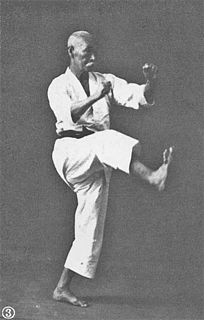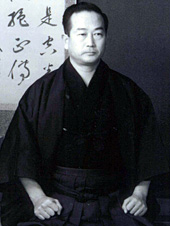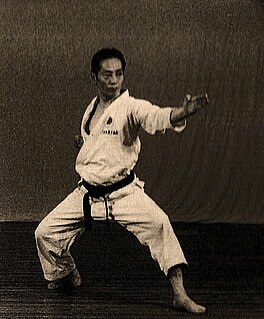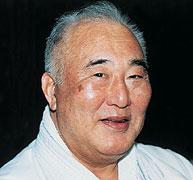
Karate (空手) is a martial art developed in the Ryukyu Kingdom. It developed from the indigenous Ryukyuan martial arts under the influence of Kung Fu, particularly Fujian White Crane. Karate is now predominantly a striking art using punching, kicking, knee strikes, elbow strikes and open-hand techniques such as knife-hands, spear-hands and palm-heel strikes. Historically, and in some modern styles, grappling, throws, joint locks, restraints and vital-point strikes are also taught. A karate practitioner is called a karateka (空手家).

Shotokan is a style of karate, developed from various martial arts by Gichin Funakoshi (1868–1957) and his son Gigo (Yoshitaka) Funakoshi (1906–1945). Gichin Funakoshi was born in Okinawa and is widely credited with popularizing "karate do" through a series of public demonstrations, and by promoting the development of university karate clubs, including those at Keio, Waseda, Hitotsubashi (Shodai), Takushoku, Chuo, Gakushuin, and Hosei.
Keigo Abe was a prominent Japanese master of Shotokan karate who founded the Japan Shotokan Karate Association in 1999 and is its Chief Instructor. He holds the rank of 9th dan in karate, is a direct student of Masatoshi Nakayama (1913–1987), and was a senior instructor in the Japan Karate Association.
Japan Karate Association is one of the most influential Shotokan karate organizations in the world. It is also one of the oldest karate organizations continuously in operation until the present.

Masatoshi Nakayama was an internationally famous Japanese master of Shotokan karate. He helped establish the Japan Karate Association (JKA) in 1949, and wrote many textbooks on karate, which served to popularize his martial art. For almost 40 years, until his death in 1987, Nakayama worked to spread Shotokan karate around the world. He was the first master in Shotokan history to attain the rank of 9th dan while alive, and was posthumously awarded the rank of 10th dan.
Hirokazu Kanazawa was a Japanese teacher of Shotokan karate. He was the Chief instructor and President of the Shotokan Karate-Do International Federation, an organisation he founded after he left the Japan Karate Association (JKA). Kanazawa was ranked 10th dan in Shotokan Karate.

Tetsuhiko Asai was a prominent Japanese master of Shotokan karate of the Japan Karate Association (JKA), founder and Chief Instructor of the International Japan Martial Arts Karate Asai-ryu (IJKA), and founder of the Japan Karate Shoto Federation.

Dave Hazard is a British 7th Dan Karateka and instructor of Shotokan karate and was one of the few students present at the very beginning of British Karate. He is a former KUGB national champion and British team member. Like many of the early karateka he first trained in judo before starting karate in 1969 at the Blackfriers club in London, where he trained under Keinosuke Enoeda, Hirokazu Kanazawa, Kato and Takahashi.
David 'Ticky' Donovan OBE is a British karate competitor and coach. He was the coach and manager of both the British and English national karate teams, from 1977 until he retired from that role in 2008. During his tenure as coach, Britain won numerous European and World championship team gold medals. It was for his achievements as a coach that he was awarded the O.B.E. in 1991. Ticky Donovan currently holds a 10th Dan black belt. He is based in Loughton, Essex.

Takayuki Mikami is a Japanese master of Shotokan karate based in the United States of America. He holds the rank of 9th dan black belt in the art, awarded under the Japan Karate Association. In 1958, Mikami tied for first place in the All Japan Karate Championships. The following year, he became the All Japan champion in kumite (sparring) as well as kata (patterns). In 1961, Mikami won first place in kata again. He was also the first person to graduate from the Japan Karate Association's (JKA) instructor training program instituted by Gichin Funakoshi and Masatoshi Nakayama.

Kenkojuku is a style of Shotokan karate previous to the establishment of the Japan Karate Association (JKA) style. It was founded by Tomosaburo Okano. Kenkojuku karate is similar to the teachings of Gichin Funakoshi and modifications made by Funakoshi´s son Yoshitaka Funakoshi. JKA Shotokan differs slightly in that it was Masatoshi Nakayama's version of Shotokan. Okano's/Yoshitaka's Kenkojuku karate and JKA karate are becoming more similar compared to other variants of Shotokan karate such as Shigeru Egami's Shotokai, Hirokazu Kanazawa's Shotokan Karate International or SKI.
JKA England (JKAE) is the official Japan Karate Association (JKA) organisation for Shotokan karate in England and Wales.

Keinosuke Enoeda was a Japanese master of Shotokan karate. He was a former Chief Instructor of the Karate Union of Great Britain. Enoeda was ranked 8th dan in Shotokan karate, and was widely renowned as a formidable karateka. Following his death, Enoeda was posthumously awarded the rank of 9th dan.

Taiji Kase was a Japanese master of Shotokan karate who was one of the earliest masters responsible for introducing this martial art into Europe. He taught his style of karate, Shotokan Ryu Kase Ha, in France from the late 1960s to the mid-1980s. In his later years, he travelled across the world teaching karate, but Paris remained his home. Kase held the rank of 9th dan in karate.
Dave Kershaw is a Shotokan karateka from Grimsby, Lincolnshire. He was an international competitor, representing Great Britain at European and World Championships between 1982 and 1998, and was British Kata Champion for a record six consecutive years, from 1987 to 1992. He was a senior SKI (GB) Instructor and Examiner up until 2011, when he formed his own organisation: Konjaku Shin International.

Malcolm Phipps is an English martial artist. He is an 9th Dan Hanshi in Shotokan Karate and is the chief instructor internationally to Seishinkai Shotokan Karate International (SSKI). He started training in karate in the early seventies with a local JKA club, then with Shotokan Karate International (SKI) with Hirokazu Kanazawa. He then moved on to the Amateur Shotokan Karate Association (ASKA), eventually leaving to form his own association, Seishinkai Shotokan Karate, in 1984 and finally turning international in 1995 to the group as it is today, SSKI, with clubs in England, the US, Kazakhstan and India. He was an advisory board member of the World Traditional Karate Organisation from 2003–2013.
Japan Shotokan Karate Association (JSKA) is one of the fastest growing Shotokan Karate associations in the world, founded by Keigo Abe in 1999. Abe was a former instructor graduate of the Japan Karate Association and trained and taught at the JKA Headquarters for nearly 35 years. He held a number of senior positions within the JKA and latterly the Matsuno section of the JKA. He had been a senior student of Nakayama and as such the teachings of Nakayama remain an integral part of the evolution of the Shotokan style within the JSKA. Abe Sensei died on the 20th of December 2019.
Minoru Kawawada is a Japanese master of Shotokan karate. He has won the JKA's version of the world championships for both kata and kumite, and has also won the JKA All-Japan Championships for kata on 2 occasions. He is currently the Vice General Manager of the Japan Karate Association Technical Division, and an instructor at their headquarters dojo, as well as the famous Hoitsugan dojo founded by Masatoshi Nakayama.
Stan Schmidt was a South African master of Shotokan karate. Along with others, such as Norman Robinson, he was an early practitioner of Shotokan karate in South Africa and his establishment of the South African branch of the Japan Karate Association (JKA) in 1965 after training in Japan, along with his subsequent promotion of the art in South Africa, earned him the appellation of 'The Father of South African Karate'. In 1963, he was one of the first westerners to be invited into the JKA's famous Instructor Class in the Tokyo Honbu dojo and he was later one of four non-Japanese karateka to sit on the JKA's international Shihankai. He was also the first non-Japanese karateka to attain 7th dan from the JKA and also the first to attain 8th dan. Today, he is the highest ranking non-Japanese karate master of that organization. He is also known for his acting roles in several martial arts films of the 1970s and 1980s.










